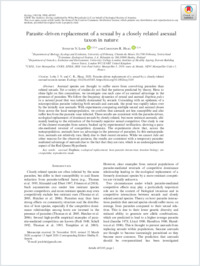Parasite‐driven replacement of a sexual by a closely related asexual taxon in nature
- Lohr, Jennifer N. Department of Biology, Ecology and Evolution University of Fribourg Chemin du Musée 10 1700 Fribourg Switzerland - Tvärminne Zoological Station J.A. Palménin tie 260 10900 Hanko Finland - Department of Genetics, Evolution and Environment University College London, Institute of Healthy Ageing Darwin Building, Gower Street London WC1E 6BT United Kingdom
- Haag, Christoph R. Department of Biology, Ecology and Evolution University of Fribourg Chemin du Musée 10 1700 Fribourg Switzerland - Tvärminne Zoological Station J.A. Palménin tie 260 10900 Hanko Finland - CEFE, Univ Montpellier, CNRS, EPHE, IRD, Univ Paul Valéry Montpellier 3 1919, route de Mende 34293 Montpellier Cedex 5 France
-
26.05.2020
Published in:
- Ecology. - 2020, vol. 101, no. 10, p. e03105
English
Asexual species are thought to suffer more from coevolving parasites than related sexuals. Yet a variety of studies do not find the patterns predicted by theory. Here, to shine light on this conundrum, we investigate one such case of an asexual advantage in the presence of parasites. We follow the frequency dynamics of sexual and asexual Daphnia pulex in a natural pond that was initially dominated by sexuals. Coinciding with an epidemic of a microsporidian parasite infecting both sexuals and asexuals, the pond was rapidly taken over by the initially rare asexuals. With experiments comparing multiple sexual and asexual clones from across the local metapopulation, we confirm that asexuals are less susceptible and also suffer less from the parasite once infected. These results are consistent with the parasite‐driven, ecological replacement of dominant sexuals by closely related, but more resistant asexuals, ultimately leading to the extinction of the formerly superior sexual competitor. Our study is one of the clearest examples from nature, backed up by experimental verification, showing a parasite‐mediated reversal of competition dynamics. The experiments show that, across the metapopulation, asexuals have an advantage in the presence of parasites. In this metapopulation, asexuals are relatively rare, likely due to their recent invasion. While we cannot rule out other reasons for the observed patterns, the results are consistent with a temporary parasite‐mediated advantage of asexuals due to the fact that they are rare, which is an underappreciated aspect of the Red Queen Hypothesis.
- Faculty
- Faculté des sciences et de médecine
- Department
- Département de Biologie
- Language
-
- English
- Classification
- Biological sciences
- License
- License undefined
- Identifiers
-
- RERO DOC 329614
- DOI 10.1002/ecy.3105
- Persistent URL
- https://folia.unifr.ch/unifr/documents/308988
Other files
Statistics
Document views: 81
File downloads:
- haa_pdr.pdf: 175
- haa_pdr_sm.pdf: 133

